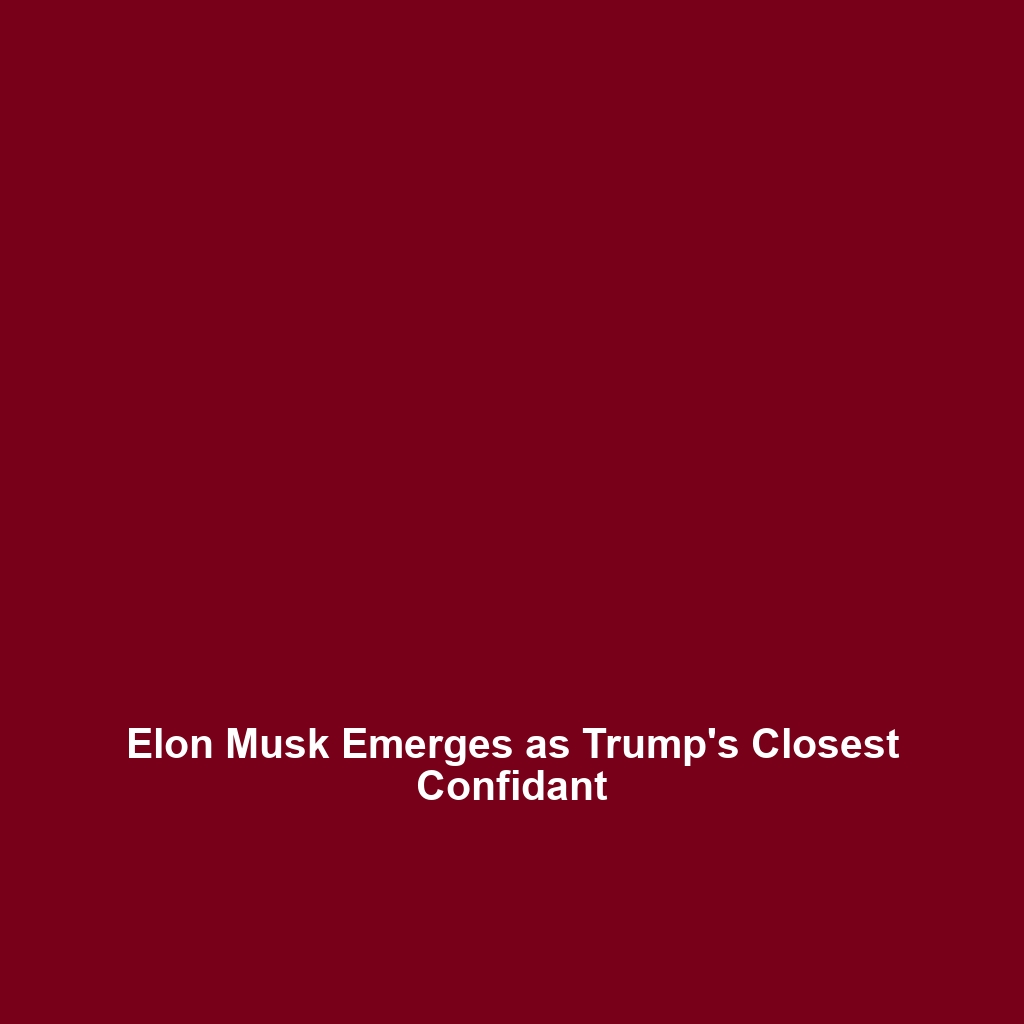Your cart is currently empty!
Tag: energy policy

Larry Ellison Invests in Clean Energy
Larry Ellison Invests in Clean Energy
Larry Ellison Invests in Clean Energy
Oracle founder Larry Ellison has announced a landmark investment of $1 billion dedicated to renewable energy projects, primarily focusing on solar and wind power. This move marks Ellison’s largest clean energy investment to date, highlighting a significant shift towards sustainable energy solutions amidst growing climate concerns.
Significance of the Investment
Ellison’s investment comes at a critical time for the clean energy sector, which is striving to meet the increasing demand for renewable sources as countries around the world implement stricter carbon reduction policies. The technology entrepreneur’s significant financial commitment is not only a testament to the potential profitability of renewable energy but also an endorsement of the urgency needed to combat climate change.
According to Bloomberg, this $1 billion investment positions Ellison as a key player in the renewable energy space, aligning with both market trends and environmental goals. Clean energy investments have surged globally, with companies increasingly directing funds towards wind and solar projects to pave the way for a sustainable future.
Focus Areas: Solar and Wind Power
Ellison’s investment will be strategically allocated to solar and wind energy projects, two of the fastest-growing sectors in the renewable energy landscape. Solar energy has gained traction due to decreasing installation costs and technological advancements, which have made solar panels more efficient and accessible.
Wind energy is another area that has seen rapid growth. According to the Global Wind Energy Council, the global installed capacity of wind energy reached over 743 GW in 2023. As efficiency improves and demand increases, the sector presents significant opportunities for investors like Ellison.
Ellison’s Vision for Sustainable Energy
Larry Ellison has a well-documented history of interest in sustainability and technology. His vision for clean energy encompasses not only traditional solutions like wind and solar but also advanced technologies that can optimize energy usage and distribution. By investing in these technologies, Ellison aims to create more resilient energy systems that can withstand the impacts of climate change and meet rising energy demands.
Experts in the renewable energy sector have lauded Ellison’s investment as a catalytic step forward. “Investments from high-profile individuals like Ellison can drive innovation and encourage a broader shift towards clean energy,” said Dr. Amanda Wong, an energy policy expert at Stanford University. “This financial backing can also serve as a signal to other investors that the clean energy sector is ripe for growth.”
The Broader Context of Clean Energy Investments
Ellison’s investment aligns with broader global efforts to transition away from fossil fuels. The International Energy Agency (IEA) reported that global investments in renewables are expected to reach $4 trillion annually by 2030 to meet climate goals. This context underscores the need for private sector involvement in conjunction with governmental initiatives to drive the necessary change.
Government policies around the world are increasingly favoring renewable energy sources through incentives, subsidies, and research funding. For example, in the United States, the Inflation Reduction Act has allocated significant resources to support clean energy projects, which complement private investments like Ellison’s.
Potential Challenges Ahead
While Ellison’s investment is undoubtedly promising, the clean energy sector is not without its challenges. Regulatory barriers, supply chain disruptions, and market volatility remain significant hurdles that could affect the deployment and scalability of renewable projects.
“The transition to a sustainable energy future requires overcoming complex logistical and regulatory challenges,” noted Dr. Sarah Jenkins, a renewable energy consultant. “While investments like Ellison’s are crucial, they must be supported by comprehensive policies and infrastructure development to truly capitalize on their potential.”
Conclusion: A Step Towards a Sustainable Future
Larry Ellison’s $1 billion investment in renewable energy represents a significant milestone within the expanding clean energy landscape. As the world grapples with the pressing realities of climate change, such financial commitments from influential figures can catalyze further advancements in sustainable practices and technologies.
In conclusion, this bold move not only reinforces the need for renewable energy but also serves as a beacon for other investors to explore opportunities within this fast-evolving sector. As concerted efforts continue, the transition to cleaner energy sources remains not just an environmental imperative but also an economic opportunity ripe for development.

Scott Bessent’s Economic Plan for the U.S.
Scott Bessent’s Economic Plan for the U.S.
Scott Bessent’s Economic Plan for the U.S.
Scott Bessent, the Treasury nominee, unveiled a comprehensive economic strategy known as the “3-3-3” plan, aimed at stimulating growth, reducing the federal deficit, and increasing oil production. This ambitious framework has drawn attention from both policymakers and economists, as it sets the stage for potential shifts in U.S. economic policy.
Understanding the “3-3-3” Plan
Bessent’s “3-3-3” plan consists of three main components: a focus on economic growth, a commitment to cutting the deficit, and an initiative to boost oil production. Each element of the plan aims to address significant challenges facing the U.S. economy and provides a roadmap for implementing these strategies effectively.
Targeted Economic Growth
The first aspect of the plan emphasizes economic growth, with targets set at an ambitious 3% annual growth rate. Bessent argues that achieving this target requires a multifaceted approach that includes tax reform, investment in infrastructure, and supporting innovation in technology sectors.
Supporters of Bessent’s plan highlight the need for tax reform to incentivize businesses to reinvest in their operations. Initiatives such as reduced corporate tax rates and simplified tax codes are seen as crucial to achieving the growth targets. According to analysis from the Tax Foundation, lowering corporate tax rates could potentially lead to increased investments and job creation, bolstering the economy further.
Deficit Reduction Efforts
The second pillar of Bessent’s plan focuses on reducing the national deficit, targeting a reduction to 3% of GDP over the next ten years. Experts in fiscal policy have noted the importance of this goal, as a high deficit can lead to negative long-term economic consequences including increased interest rates and reduced investment.
To achieve this target, Bessent proposes a mix of spending cuts and revenue enhancements. This includes examining federal programs for inefficiencies and unnecessary expenditures while ensuring that essential services and social safety nets remain intact. Bessent emphasized a balanced approach during his announcement, in line with recommendations from the Congressional Budget Office (CBO) regarding sustainable fiscal practices.
Increasing Oil Production
The third component of Bessent’s plan is the increased production of domestic oil. With energy prices fluctuating and the global demand for oil persisting, Bessent argues that boosting U.S. oil production could lead to greater energy independence and lower prices for consumers.
Industry experts have pointed out that expanding oil production aligns with national security interests as well, reducing reliance on foreign oil sources. Additionally, this element of the plan may create thousands of jobs across the country in various sectors including extraction, transportation, and refining. However, concerns about environmental impact and sustainability have led to vigorous debate over this aspect of the proposal.
Stakeholder Responses and Concerns
While Bessent’s plan has received support from various business groups and some economists, it has also faced criticism from environmental advocates and fiscal conservatives. Critics argue that the emphasis on oil production could undermine efforts to transition to renewable energy sources. They caution that without a comprehensive energy policy that includes renewable investments, the plan may fall short of addressing long-term energy and environmental challenges.
Additionally, some fiscal conservatives remain skeptical of Bessent’s deficit reduction claims, expressing doubts about the feasibility of achieving these goals without significant changes to entitlement programs. They emphasize the need for a more nuanced approach that balances economic growth with responsible fiscal management.
Conclusion: A Path Ahead for the U.S. Economy
Scott Bessent’s “3-3-3” plan offers a bold vision for the U.S. economy, intertwining growth objectives with deficit reduction and increased oil production. As the nomination process unfolds and Bessent faces Senate confirmation hearings, the details of his plan will likely come under intense scrutiny.
Should Bessent be confirmed, the success of the “3-3-3” strategy will hinge on bipartisan support and the ability to navigate complex political and economic landscapes. The plan’s implications span not only the economy but also energy policy, fiscal responsibility, and job creation, making it a critical aspect of the national dialogue in the months ahead.

Elon Musk’s Influence in Trump’s Inner Circle
Elon Musk’s Influence in Trump’s Inner Circle
Elon Musk’s Influence in Trump’s Inner Circle
In recent developments within American politics, Elon Musk, the CEO of SpaceX and Tesla, has reportedly become a significant and influential figure in former President Donald Trump’s inner circle. His involvement is believed to encompass key decisions on policy and appointments, shaping the landscape of Trump’s post-presidency agenda and potential future campaigns.
Musk’s Ascendancy in Political Circles
Elon Musk, known for his innovative ventures in technology and space exploration, has increasingly drawn attention for his engagement in political matters. As a billionaire entrepreneur, his wealth and influence afford him access to power corridors, positioning him as an unlikely yet pivotal advisor in Trump’s circle. According to reports from credible news outlets such as The New York Times and The Wall Street Journal, Musk’s relationship with Trump began to strengthen following the latter’s departure from the White House.
Musk, who has maintained a prominent social media presence, often shares insights and opinions that appear to align closely with Trump’s policies, especially regarding technology, energy, and economic initiatives. His platform has expanded significantly since assuming the role of CEO at Twitter, further enhancing his visibility and allowing him to engage with Trump’s supporters directly.
Policy Influence: A Focus on Technology and Energy
One of the critical areas where Musk’s influence is expected to manifest is in the realm of technology and energy policy. Under Trump’s administration, Musk was recognized as a key player in advocating for renewable energy initiatives, despite criticisms surrounding the former president’s overall stance on climate issues. As Trump considers potential policies moving forward, Musk’s expertise in electric vehicles and sustainable technology is likely to guide decisions on infrastructure and job creation in green energy sectors.
Musk’s participation in Trump’s advisory discussions could also influence decisions related to space exploration, particularly with SpaceX’s growing capabilities. Experts believe that Musk’s vision for space could align with Trump’s ambition to revitalize the American space program. Dr. James C. Oberg, a space policy analyst, noted, “Musk’s ability to disrupt the traditional aerospace sector positions him as a credible consultant for reshaping national priorities in space exploration.”
Trump’s Potential Appointments and Musk’s Role
Another area of significant concern is what role Musk may play in future appointments within the Trump administration should he decide to run for office again. With strong ties to influential figures in Silicon Valley and other business leaders, Musk could facilitate the selection of individuals who share similar ideologies and priorities in governance.
Former White House Chief of Staff Mark Meadows commented on this evolving dynamic: “Musk has a unique ability to attract talent. His influence may well extend beyond mere advisory roles and into appointments that can steer policy directions in Trump’s future endeavors.” Such speculation raises questions about the potential synergies between Musk’s private sector experience and Trump’s political strategies.
Criticisms and Challenges Ahead
While Musk’s influence is seen as a potential asset to Trump’s political strategies, it is not without challenges. Critics have raised concerns about the implications of a billionaire’s influence on public policy. Concerns regarding inequality, corporate governance, and accountability in political decisions loom large. Critics argue that the entry of corporate leaders into political spheres could blur the lines between business interests and public good.
Political analyst Sarah L. Anderson emphasized, “Elon Musk’s engagement in politics is a double-edged sword. His ability to push innovative agendas is valuable, but it requires scrutiny to ensure that the public interest is prioritized above profit motives.” This highlights the necessity for transparency in any potential policy discussions orchestrated by Musk within Trump’s circle.
The Future of Musk-Trump Dynamics
As Trump continues to explore his political future, the importance of Musk’s role in shaping policy directions cannot be overstated. Analysts are keenly observing the unfolding relationship, particularly leading into potential 2024 presidential elections. The intersection of technology, economic policy, and political strategy presents a complex landscape that could redefine partisan alignments.
With growing public interest in the back-and-forth between these two powerful figures, further developments are expected. Observers speculate on how Musk might continue to leverage his influence, not only within Trump’s ambitions but across broader Republican strategies that engage values around innovation and growth.
Conclusion
Elon Musk’s increasing presence within Trump’s inner circle is indicative of a rapidly shifting political environment, one where traditional boundaries between business and politics are continuously blurred. As Trump looks to redesign his political playbook, Musk’s role as a top advisor could have lasting implications on critical policies and appointments.
Moving forward, it remains essential for stakeholders and citizens alike to monitor this evolving relationship carefully. The intersection of innovative entrepreneurship and governance raises critical questions about the future trajectory of American politics and policy-making. As the 2024 elections approach, understanding Musk’s influence will be crucial for evaluating both Trump’s strategy and the implications for broader public policy.

Elon Musk Emerges as Trump’s Closest Confidant
Elon Musk Emerges as Trump’s Closest Confidant
Elon Musk Emerges as Trump’s Closest Confidant
In a surprising turn of events, tech mogul Elon Musk has become a significant advisor to former President Donald Trump, assisting in selecting cabinet members and influencing key policy decisions. This partnership signifies a deepening relationship between Musk and Trump, who has increasingly leveraged the entrepreneur’s influence and resources.
Strengthening Political Ties
Musk’s rise in political advisory roles follows his high-profile presence during Trump’s presidency, particularly in areas concerning technology, energy, and space exploration. His perspective as the CEO of Tesla and SpaceX provides Trump with valuable insights into industries pivotal to the nation’s economic future. According to a source close to the matter, Musk’s engagement in Trump’s inner circle signals a possible shift in political dynamics as both figures share interests in innovation and infrastructure.
Impacts on Policy Decisions
Musk is reportedly advising Trump on several key issues, including energy policy, environmental regulations, and public transportation. His role in renewable energy discourse is particularly relevant, considering his prominence in electric vehicles and solar energy through Tesla’s initiatives. A recent analysis by political commentators highlights that Trump’s cabinet selections may increasingly reflect Musk’s influence, particularly in the Department of Energy and the Environmental Protection Agency.
Experts argue that Musk’s input could reshape the Republican party’s stance on climate change and innovation. David Victor, a senior fellow at the Brookings Institution, noted, “Musk’s advocacy for sustainable technologies could provide Trump with a unique platform to present a more forward-thinking approach to energy policy.”
Musk’s Strategic Positioning
As the face of two multi-billion dollar companies, Musk not only brings entrepreneurial expertise but also a vast network of connections in both the private and public sectors. His relationships extend into the worlds of finance, energy, and technology, providing Trump with an unparalleled resource for navigating complex political landscapes.
Recent reports indicate that Musk has been involved in discussions regarding infrastructure projects, advocating for transportation advancements such as high-speed rail and hyperloop systems. These issues resonate with Trump’s base, which often emphasizes job creation and economic prosperity through infrastructure development. “Musk could be the bridge between technology innovation and political feasibility,” commented Rita McGrath, a professor at Columbia Business School.
Criticism and Controversy
Despite the potential benefits of their collaboration, the relationship has not been without controversy. Critics argue that Musk’s influence could further entrench corporate interests within government policy, a concern expressed by environmental activists and public policy experts alike. “There is a real danger in having someone with Musk’s financial interests bog down government in a technology-centric agenda,” warned environmentalist Anne Hall.
Moreover, Musk’s unpredictable nature and active social media presence raise concerns regarding his public persona and its implications for serious policy discussions. His past statements and tweets have often sparked debate, leading some to question the stability of his advice to a former president. Political journalist Sarah Cooper remarked, “Trump may enjoy Musk’s bold approach, but the potential volatility shadowing Musk’s public image cannot be ignored.”
Future Implications
The evolving relationship between Musk and Trump reflects broader trends in American politics, where celebrity influence is increasingly mirrored in governmental affairs. The impact of this partnership on upcoming elections, particularly the 2024 presidential race, remains to be seen. Should Musk continue to play a pivotal role, it might signal a shift toward a more entrepreneur-driven policy format within the Republican party.
Trump’s favorable views on technology and innovation could also lead to a resurgence of focus on the industries that Musk epitomizes. Analysts suggest that this partnership could enhance the Republican platform, making it attractive to younger, more tech-savvy voters who prioritize climate and innovation.
Conclusion
As Elon Musk ascends to the role of Trump’s closest confidant, the implications for both the individual companies he leads and the broader political spectrum are significant. A potential reshaping of policies surrounding technology, energy, and infrastructure is on the horizon, influenced heavily by Musk’s vision. Observers will be watching closely to see how this alliance unfolds and what it means for the future of American governance and corporate involvement in politics.
For further insights, consider reading “The Power of Influence: Technology and Politics in the 21st Century,” which explores the interplay between business leadership and political strategy.

Chris Wright Highlights Liberty Energy’s Role in Sustainable Solutions
Chris Wright Highlights Liberty Energy’s Role in Sustainable Solutions
Chris Wright Highlights Liberty Energy’s Role in Sustainable Solutions
In an era of increasing environmental concerns, the energy sector is under pressure to adopt sustainable practices. Chris Wright, CEO of Liberty Energy, is a key player in this transition, championing innovative solutions aimed at reducing carbon footprints across the industry. Liberty Energy, a prominent name in the energy sector, has set a course to not only enhance its operational efficiency but also contribute positively to the global effort against climate change.
Liberty Energy’s Vision for Sustainability
Wright underscores that the company’s mission revolves around three core pillars: sustainability, efficiency, and innovation. “Our goal at Liberty Energy is not just to be a leader in energy production, but to lead a transition toward a more sustainable energy landscape,” he stated in a recent interview. The company is actively investing in technologies that reduce emissions and lower the environmental impact of their operations.
One particular focus for Liberty Energy has been the integration of renewable energy sources into its portfolio. By investing in wind and solar power, Wright believes that the company can diversify its energy offerings while contributing significantly to the reduction of greenhouse gases. According to the International Renewable Energy Agency (IRENA), transitioning to renewable energy could reduce carbon emissions by more than 70% by 2050.
Innovative Solutions Being Implemented
Liberty Energy’s commitment to sustainability is exemplified through various initiatives aimed at innovating traditional energy processes. A notable project is the development of carbon capture and storage (CCS) technology. Wright emphasizes that “CCS not only mitigates emissions but also demonstrates our responsibility to address climate change proactively.” This technology enables the safe capture and storage of carbon dioxide, preventing it from escaping into the atmosphere.
Moreover, the company is also exploring hydrogen as a clean energy carrier. Wright points out, “Hydrogen has the potential to be a game-changer in the energy landscape, especially for heavy industries.” Liberty Energy is currently collaborating with several partners to develop technology that can produce hydrogen from renewable sources, which would serve as an alternative fuel for transportation and manufacturing industries.
Challenges in the Energy Sector
Despite the advances Liberty Energy is making, Wright acknowledges the inherent challenges in driving sustainability within the energy sector. Regulatory hurdles, market volatility, and the need for substantial upfront investments can impede progress. “Transitioning to sustainable practices is essential, but it requires a concerted effort from both the private sector and government bodies,” he stated.
Industry experts agree that enhanced collaboration across various sectors is vital. According to Dr. Alice Johnson, an energy policy researcher at the University of California, Berkeley, “Partnerships between energy companies, technology providers, and regulatory authorities can accelerate the transition to sustainable energy solutions.”
The Role of Policy in Promoting Sustainable Practices
Wright advocates for policies that provide incentives for companies transitioning to sustainable practices. He believes that government support can significantly reduce the financial burden associated with adopting new technologies. “When policies encourage investment in green technologies, businesses will prioritize transitioning away from fossil fuels,” he noted.
Wright’s perspective aligns with findings by the World Resources Institute, which highlights that comprehensive policies can boost job creation in the renewable energy sector. Such policies not only have the potential to mitigate climate change but also offer economic opportunities as the world moves toward a more sustainable energy model.
Future Directions for Liberty Energy
Looking ahead, Wright asserts that Liberty Energy plans to expand its sustainable initiatives in alignment with global climate goals. The company is actively assessing new technologies and strategies that can enhance sustainability and operational efficiency. “We are committed to continuous improvement in our energy solutions to ensure a better future for our planet,” he declared.
As part of its strategy, Liberty Energy is also enhancing its stakeholder engagement efforts, ensuring that community perspectives are included in sustainability initiatives. Wright emphasizes the importance of transparency and advocacy in gaining public trust as the company evolves its business model to one that is more environmentally conscious.
Conclusion
Chris Wright’s leadership at Liberty Energy illustrates a concerted effort to impact sustainability within the energy sector positively. Through innovative projects in carbon capture, investments in renewable energy, and strong advocacy for supportive policies, Liberty Energy is positioning itself as a leader in the transition to sustainable energy solutions.
As the energy landscape continues to evolve, the actions taken by companies like Liberty Energy will be crucial in determining the pace and success of this transition. With ongoing challenges, a commitment to sustainability remains imperative for the future of energy production and the health of our environment.